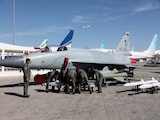- Five terrorists linked to Pakistan-based groups were killed during Op Sindoor
- Photos of top Pakistan military officers attending the funeral had gone viral
- It had exposed the decades-old nexus between Pakistan's army and terrorists
Five terrorists tasked with important roles in the Pakistan-based terror groups, Jash-e-Mohammed and Lashkar-e-Taiba, were killed in the initial phase of Operation Sindoor when Indian forces struck terror camps deep inside Pakistan and Pakistan-Occupied Kashmir (POK) in the early morning of May 7, said sources. Follow live updates here
These five terrorists were identified as Mudassar Khadian Khas, Hafiz Muhammed Jameel, Mohammad Yusuf Azhar, Khalid alias Abu Akasha, and Mohammad Hassan Khan, added the sources.
Photos of top Pakistan officers attending the funeral of these terrorists in military uniform had gone viral, exposing the decades-old nexus between Pakistan's army and terrorists. India has flagged an image - showing the coffin of a terrorist draped in Pakistan's flag - as the undeniable evidence of Pakistan's involvement in global terrorism.
Mudassar Khadian Khas
Khas, who went by the names Mudassar and Abu Jundal, was affiliated with the Lashkar-e-Taiba. He had the charge of Markaz Taiba, a terror camp based in Muridke, Pakistan, located about 25 km from the border with India. It served as the headquarters of the LeT.
Ajmal Kasab, the only terrorist caught alive during the 2008 Mumbai attacks, had confessed that he received his training at this camp. David Headley, another terrorist involved in 26/11, also reportedly trained here.
Khas' funeral was led by designated global terrorist Hafiz Abdul Rauf at a government school, said sources. At his funeral, Khas was given a guard of honour by the Pakistan Army with top military officers laying a wreath on behalf of Pakistan Army chief General Asim Munir and Maryam Nawaz, Chief Minister of Punjab Province.
Those who attended his prayer ceremony included a serving officer of the Pakistan Army holding the rank of Lt General and the Inspector General of Punjab Province's police.
Hafiz Muhammed Jameel
Jameel was associated with Jaish-e-Mohammed and the brother-in-law of Masood Azhar, the founder of the JeM. He held the charge of Markaz Subhan Allah in Bahawalpur, about 100 km deep inside Pakistan. He actively indoctrinated potential recruits for the JeM and helped raise funds, said sources.
The Bahawalpur camp was used for recruitment, training, and the indoctrination of potential recruits and was frequented by Azhar. The strike on the terror camp on May 7 killed at least 10 family members of Azhar and his four aides, according to a statement attributed to the wanted terrorist shared by the news agency PTI.
Mohammad Yusuf Azhar
Yusuf Azhar, alias Ustad Ji and Mohd Salim, also belonged to the Jaish. He was also the brother-in-law of Masood Azhar and handled weapons training for the JeM. He has been involved in multiple terror attacks across Jammu and Kashmir, and the hijacking of the IC-814 plane in 1999, popularly known as the Kandahar hijacking, which led to the release of Masood Azhar by India in exchange for the hostages.
Abu Akasha
Abu Akasha, alias Khalid, was a Lashkar terrorist who was involved in multiple terror attacks in Jammu and Kashmir. He played a key role in smuggling weapons from Afghanistan for the LeT. His funeral in Faisalabad was attended by senior officials of the Pakistan Army and the Deputy Commissioner of Faisalabad, said sources.
Mohammad Hassan Khan
Khan, who belonged to the banned Jaish group, was among the terrorists killed in the May 7 strikes. He was the son of Mufti Asghar Khan Kashmiri, operational head of the JeM in POK, and played a key role in coordinating terrorist attacks in Jammu and Kashmir.
These terrorists were eliminated during the first strike carried out by the Indian forces under Operation Sindoor three days ago, in response to the massacre of 26 civilians in Pahalgam by terrorists linked to Pakistan. India had blamed Pakistan for "sustained cross-border terrorism" after the terror attack.















